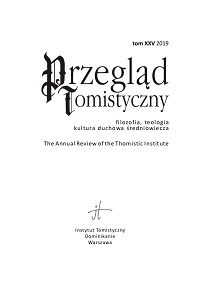How to Measure Different Movements? The 14th-century Treatise De sex inconvenientibus
How to Measure Different Movements? The 14th-century Treatise De sex inconvenientibus
Author(s): Joanna PapiernikSubject(s): Logic, Philosophy of Middle Ages, Philosophy of Science
Published by: Instytut Tomistyczny
Keywords: Oxford Calculators; De sex inconvenientibus; motion; Aristotle; Averroes; Richard Kilvington; Thomas Bradwardine; William Heytesbury
Summary/Abstract: The anonymous treatise De sex inconvenientibus was written by an author who presumably belonged to the group of Oxford Calculators. This text is important in the history of the development of mathematical physics in the Late Middle Ages, as it can be considered a link between the achievements of the older Calculators and the compendium of knowledge of the whole group, i.e. the work of John Dumbleton. The four questions discussed in this text concern the speed in the process of generation (De generatione), motion of alteration (De motu alterationis), motion of augmentation (De motu augmentationis) and in the local motion (De motu locali). The paper presents the sources of the work and explains what are — according to the author of this work — the most adequate methods used in considerations on measuring speed in movements. It also demonstrates the profound dependence of the author on his predecessors who had earlier dealt with the issues concerning movements.
Journal: Przegląd Tomistyczny
- Issue Year: 2019
- Issue No: XXV
- Page Range: 445-460
- Page Count: 16
- Language: English

